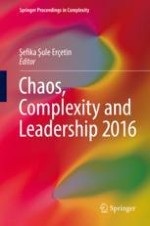2018 | OriginalPaper | Buchkapitel
47. In Chaotic Situations in Preschool Institutions, Do Leaders Reach Through the Game?
verfasst von : Behiye Ertaş
Erschienen in: Chaos, Complexity and Leadership 2016
Aktivieren Sie unsere intelligente Suche, um passende Fachinhalte oder Patente zu finden.
Wählen Sie Textabschnitte aus um mit Künstlicher Intelligenz passenden Patente zu finden. powered by
Markieren Sie Textabschnitte, um KI-gestützt weitere passende Inhalte zu finden. powered by
